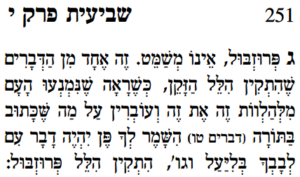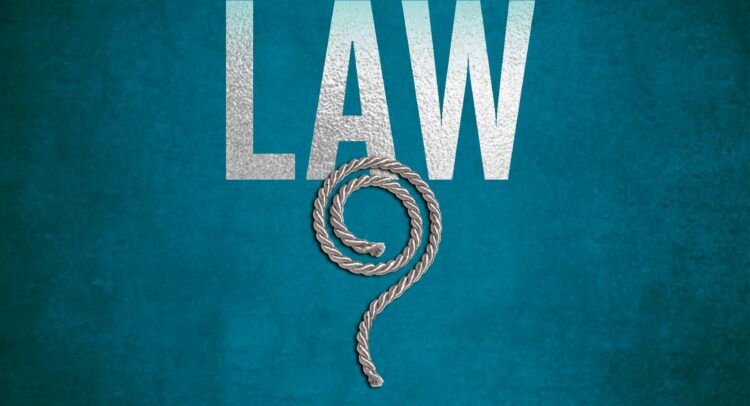Raboyseyee and Ladies,
In late-breaking mazel tov news, a big mazel tov to our dear friends Judith and Shlomo Gottesman upon the arrival of a new grandson- yes, you read that correctly- born to their children Talia & Gabi Stone. Mazel tov to Talia and Gabi and to both extended Gottesman and Stone families. May baby boy Stone bring you all much nachas.

Do Loopholes Make Us Better Jews?
From time to time, and more so as we get older and wiser, those who grew up FFB (frum from birth) poke fun of the many loopholes that our gracious sages built into our system of laws. We enjoy them, take advantage of them, yet chap what they are and just how they are designed. To cheat the system? To work around a restriction the RBSO put into place? Our sages decided that although the RBSO said X, Y, or Z, it’s likely not what He meant and took it upon themselves to make changes. The Ois has been discussing this topic over the past few weeks and shared specific examples. We discussed that when the RBSO stated explicitly that a person be put to death for various sins, that in many instances, perhaps most if not all, He really didn’t mean it. We came to this conclusion based on what our sages taught us and enacted.

Shoin, we’re back with another edition of ‘how loopholes allow us to function without violating Toirah principles.’ Ober, as kimat always, we begin with news.
First the good news: Behar is a tiny parsha with only 57 pisukim (5th shortest) leaving us with barely enough time to engage in a decent conversation with your chaver during laining. Yet, it ranks 8th in number of mitzvis and not too shabby for a tiny parsha. Some are mamish on our radar daily. Ober, because it’s not a leap year and efsher because you might be confused as to when to exit the shul and enter into the kiddish club room, our sages added another parsha with 78 pisukim, and this shabbis you’ll have a total of 135 pisukim during which you can either initiate, participate in, or add to what is being said by someone, who heard from someone, something about someone else. This is why many go to shul to begin with. Shoin. A few will be more machmir (strict) and will only discuss these topics bein-gavra- ligavra (between aliyis) so as not to disturb the decorum of the shul. Mamish tzadikim.
On the other hand, many of us will mistama not be paying much attention to parts of Bichukoisai as the baal koira is required to read them in a hushed tone. The bottom line: If someone is reading in a hushed tone, it must mean that he doesn’t want us to hear what he’s reading. Should we then annoy him by paying close attention? Mistama not! Veyter.
The second half of our spring doubleheader parshas features the well-known curses and punishments the RBSO has in mind for you -and the rest of us Yiddin- should our collective chazerish behavior continue unabated. And if the gory details aren’t enough to scare us straight, they will mostly -with even more gore- be repeated later on in Sefer Devorim when we read Parshas Ki Sovi over the summer. The bottom line: Why worry now?
With the reading of Bichukoisai, we will conclude Sefer Vayikra. Next week as we begin book number four, Sefer Bamidbar, we will revisit the Yiddin as their trek aimlessly through the desert continues. Originally scheduled to take but days and weeks to enter the promised land, the sin of a few miraglim (spies) and the oversized fruits they schlepped back to show and scare the Yiddin with, derailed the entire plan. The bottom line: They went off script and the midbar experience was elongated to 40 years. During that time period, the Yiddin, mistama bored out of their minds with little to do -mamish nothing- as they were without TV, Fox News, Trump Derangement Syndrome, Instagram, TikTok, ChatGPT, and other AI tools, resorted to making their own entertainment. The RBSO was not always pleased with their selected activities and took the opportunity to thin out the population so that by the time the Yiddin made it over to the Promised Land, none of the men who had left Mitzrayim between the ages of 20 and 60 –with the exception of Yehoshua, Kolave and maybe a few others- were alive for the final journey.

So happens that Behar is most well-known for its coverage of Shmita and Yoivel. We have previously covered these topics -check them out at the archives of the Ois’s robust site – www.Oisvorfer.com – we shall not repeat them here. The bottom line: The laws governing Shmita and Yoivel were given over by the RBSO Himself and are quite serious. How do they affect us in 2025 here in the Five Towns and around the world, wherever Oisvorfer readers find themselves? They do not! Yoivel is altogether not operative for several reasons, and as to Shmita, though it has made a comeback as it rolls around every seven years when we are flooded with money campaigns to help the farmers who observe it over in Israel, as to us, aside from plowing and seeding whenever we get the opportunity, if you chap, most of you are not farmers, and these laws mostly do not apply to us. That was one very long sentence. Veyter.
Let’s get to our topic of the week, sanctioned loopholes. It so happens that a number of mitzvis found in Parsha Behar gave birth to a few of the greatest sanctioned loopholes. Our wise sages figured out that loopholes are an integral part of our Toirah observance. In other words, they recognized that in real life, the restrictions placed on the Yiddin by the commands as written in the heylige Toirah, would make daily life very challenging. In some cases, mamish intolerable. They also figured out that the RBSO would not want us living with such restrictions. And the questions on my mind include these: Is Behar the birthplace of all loopholes? Does this parsha contain the motherload of loopholes? To find answers, let us begin here.
Behar gives us a number of mitzvis that our Sages later had to navigate through halacha to allow life and society to function. In other words, as written and given over, the Yiddin either could not, or would not, function properly. It lays out several radical economic ideas and models, let us shout them out: You purchased land and think it’s yours forever? Ha! Fuhgeddaboudit! Come Yoivel, the land you purchased isn’t really yours; it reverts back to the seller. Why is that? Because the RBSO proclaims that all land is His! Case closed! From this Toirah concept, much later, in the world of real estate transactions, the concept of the ‘land-lease’ -still in use today- was born. Next: When lending money to a friend -or anyone else- one cannot charge interest. In the heylige Toirah, this is called ‘Ribbis’ and it is mamish strictly verboten. Yikes! And yet the Yiddin -in large numbers- became money-lenders? How did that work? There’s more: Come Shmita, Jewish slaves -the eved ivri- go free. There’s also this: Commerce is subject to ethical review (Oona’ah in pricing). We must deal with people honestly. It does appear that Yiddin decided on their own that this Toirah law could not possibly mean what it says and -loophole-shmoophole- have been ripping each other off for generations. Them are just the sad facts. More on that another time.

The bottom line: The mitzvis in our parsha are deeply moral laws, but in real-world societies, they’re hard to maintain. What to do? Not to worry because our sages recognized the difficulties that these laws imposed on the Yiddin and sprang into action. Lending money for zero interest? Unthinkable! Unfathomable, unworkable, and unacceptable. What to do? They needed a fix. Ober, lest you think that all loopholes come from our parsha, and though its taka uniquely packed with mitzvis that later led to halachic mechanisms -loopholes- not all loopholes are found in Behar. Other famous halachic mechanisms come from elsewhere in the heylige Toirah and include the world-famous Pruzbil. Back to the Pruzbil soon. The selling of chomatze to a goy who has no intentions -mamish zero- of closing on the transaction, and for those who are divorced or considering one, the Get delivery rules, are all from other parshas. In these instances too, various Sages stood up to the written words in the heylige Toirah and decided that there had to be a way to make it work. So happens that the Pruzbil, the debt collection mechanism is based on a posik in Parshas Re’ay and the sale of chomatze is out of Parshas Boi. Oh, and we mamish forgot to shout out and thank our Sages for creating the Erev Chatzeyris, the mechanism which allows us to carry, wheel a carriage, and much more on the heylige shabbis. Can you imagine life without an erev? It would be analogous to going back to the rotary phone, the 8-track, the telex, and even the Blackberry. We love our Sages.
Ober let us get back to our parsha which happens to contain many of the mitzvis that later led to halachic mechanisms. Vus epes Behar? Because its laws touch on long-term financial and social structures, and when it comes to money, people suffering, people unable to borrow, people unable to make a living by lending, and other such examples -kimat always money centric- our sages knew what to do. Ober, were they on solid ground? Did the RBSO sanction changes to His written words? On what authority were our sages making changes? And just when -how many years following Matan Toirah (Revelation) and the teaching of Toirah laws- passed before sages sat down to develop Toirah-sanctioned loopholes?
Let us review. To overcome laws from Behar, our sages came up with the ‘Heter Iska’ (to avoid ribbis), the Pruzbil (to preserve lending near Shmita), and legal strategies for avoiding the forced return of land. Shoin, let’s pin down the timeline and the people behind the earliest halachic workarounds to our parsha’s laws. When did these things happen? The heylige Toirah was given in ~1312 BCE which according to tradition, was in the year 2448 from creation. Kimat 1200 years would pass before the Pruzbil was invented by Hillel Hazokane (the Elder). And his credentials? He was -says the Mishneh (Shevi’is 10:3) the Nosi of the Sanhedrin. What happened? He took notice that commerce ground to a halt -mamish as if tariffs of 150% were introduced. Let’s quote the Mishneh: “When people stopped lending before the Shemita year, Hillel established the Pruzbil.” His enactment was one of the earliest formal rabbinic mechanisms designed to preserve the spirit of the Toirah, even while adapting its legal form. Mamish amazing! Ober, there’s more.

Besides the land restrictions, Shmita nullifies outstanding debts. It does what? It’s one thing to prohibit plowing – many have gotten used to this already, if you chap- ober the nullification of debts? And the halocho (rule) is, or was, azoy: At the end of a Shmita year, all loans or debts between Jewish people (men or women) that are due before Rosh Hashono, are cancelled. Over and done! Did you just read that one can borrow money from his best friend, wait seven years (even less if the loan was taken closer to a Shmita year) and then tell the lender that he’s not being paid because his loan expired due to Shmita? Indeed you did. This is called ‘Shmitas Kisaofim’ (a debt wipe-out, if you will). Moreover, not just is the loan wiped out but one is forbidden by a loi-sah-say (negative prohibition) from requesting repayment from the borrower. Requesting repayment of your loan after Shmita, the very one you provided in good faith before the Shmita year, is a no no! This includes debts resulting from monetary loans as well as those incurred from borrowing items that have been consumed. In other words: your money is gone!
On the other hand, why shouldn’t Shmita wipe out your loan? Where is it written that just because you were nice enough to advance a chaver (friend) a much-needed loan, that you are entitled to get repaid? Don’t you know that no good deed goes unpunished? And this isn’t just a minhag (custom) but a din (rule)! Want more bad news? Bazman Hazeh (in our times), even when the laws of Yoivel are not applicable, according to most Halachic authorities, the mitzvah of Shmitas Kesafim (Rabbinic only) remain in effect. And taka why? Says the heylige Gemora that this was instituted so that these laws would not be forgotten from Israel. Not to worry because the guy you just took for his money claiming shmita will never forget! It appears from the good books, that this ruling applies both in Israel and in chutz lo’oretz (here), since it is an obligation dependent on the person (gavrah) and not on the land (adomoh).
Shoin, what to do about this halocho? How do we operate? Would people lend money even for a high interest rate in year six (or earlier) if they understood that such loans are subject to being wiped out in year seven? A nechtiger tug and avada nisht! Ober not to worry because Toirah/shmoira, the good rabbis chapped that business is business and that the rules of shmita and loan cancellation would mamish shut down the money lending business and efsher the gantze (entire) economy. Who would support their local rabbis if they weren’t getting their loans repaid and couldn’t collect interest? Nu, when the rabbi’s parnosa (livelihood) was potentially affected, they came up with one of the cleverer loopholes ever created and named it the Pruzbil. And Chasdei Hashem (through the kindness of the RBSO), halocho makes use of “evasions” of the law in various different realms.
Ober where is it written that one should taka lend money to those in need? Nu…the heylige Toirah (Devorim 15:2; 9-10) says just that in discussing shmita; let’s learn the pisukim. “And this is the law of the Shemita; to release the hand of every creditor from what he lent his friend; he shall not exact from his friend or his brother, because the time of the release for the L‑rd has arrived … Beware, lest there be in your heart an unfaithful thought, saying, “The seventh year, the year of release is approaching,” and you will begrudge your needy brother and not give him… You shall surely give him, and your heart shall not be grieved when you give to him; for because of this the L‑rd, your G‑d, will bless you in all your work and in all your endeavors.” Shoin, case closed and lending is a must.
Nu, as you can see, the RBSO was worried about us having unfaithful thoughts, even about money issues. Says the heylige Gemora (Gittin) azoy: About a century before the destruction of the Second Beis Hamikdash (Temple) a man named Hillel the Zoken (the elderly) came up with mamish a gevaldige loophole, one of many that allow us Yiddin to survive on a daily basis. After all, the heylige Toirah does state Vochai Bohem (and you shall live by them) and avada we translate that to mean that if a law makes life so unbearable, we may find a way around it. Anyway, Hillel saw that people were avoiding lending, and because he didn’t want them to commit the avayro of not lending to those who needed help (a sin mamish described above), as the Shmita year approached, he came up with this brilliant chap (novel idea).
How does it work? Like a loophole should! The Toirah tells us that only private debts are cancelled by Shmita: “He shall not exact from his friend or his brother.” Read those words again. If, however, one owes the court (i.e., the community) money, Shmita does not affect the loan. Based on the wording of the heylige Toirah, Hillel instituted the “Pruzbil,” a mechanism by which debts are magically transferred from the individual to a Beis Din (religious court). By making a Pruzbil, one makes his private debts public – and therefore redeemable. Shoin no SEC, no IPO- gornisht (nothing). Want to go public? A simple Pruzbil does the trick. Exactly how the funds are collected by the Beis Din and how they are repatriated to the original lender, ver veyst, but one has to assume that after a proper vig is paid to the Beis Din, the rest somehow makes its way back. As the heylige Ois understands the mechanics, once the loan is declared as now belonging to the beis din, you can actually collect it yourself. And as to why Hillel was allowed to enact this loophole, we are taught that there was a pressing need. Mistama a concept similar to hefsed meruba (big losses) which did away -or greatly diminished the effects of sefira and other restrictions. One day in the very near future, shuls will be permitted to swipe credit cards on shabbis following an appeal or an aliya when one makes a pledge.
Who empowered Hillel to go against what the heylige Toirah’s demands? And as you can only imagine, the Gemora has lots to say on this inyan. And not just the Gemora, for generations since, they’re still discussing Hillel’s bold move, the issues and its mechanics. And says Toisfis (a commentator on the heylige Gemora), azoy: There was mamish no concept of Shmita or Yoivel during the 2nd Beis Hamikdash because a majority of the Yiddin were living outside of Israel, a concept we covered several years ago. Hence Hillel did nothing wrong. Others say Hillel was not the creator of this loophole and that he was merely given credit because he publicized an already existing loophole in the Toirah which allowed private debt to be converted into court debt. In other words: Hillel, mistama the first Jew in that position, was acting like the Federal Reserve during a crisis in order to allow the banking system to work for the Yiddin. Shoin, who should it work for, the goyim? Of course, you’re now wondering what will happen if and when the Moshiach arrives. Will we need loopholes if they bring back Shmita and Yoivel? Is Hillel coming back? Ver veyst?
And listen to this vichtiger nikuda (important point). There are various types of debts which do not require a Pruzbil and can be collected after shmita even without the paperwork. Lemoshol (by way of example), debts which arise as a penalty or fine — such as the money a man must pay his victim for rape or seduction. You can see just how clever our sages were, they chapped even back then that the men were chazerim -bad boys and had to make provisions for their victims to be able to collect. Also, a woman’s kesubah (marriage contract) may be enforced. There are a few others but do I expect you to concentrate once you read about seduction? Zicher nisht! Go look them up.
Shoin, with the help of ChatGPT, a very new tool in the Ois’s armamentarium, the Ois is able to share this table showing the various workarounds, who enacted them, and when they came to be.
| Mechanism | Approx. Date | Enacted By | Source |
| Prusbil | ~100 BCE | Hillel the Elder | Mishnah Shevi’is 10:3 |
| Heter Iska | ~600–1100 CE | Geonim/Rishonim (e.g., Tosafists) | Gemora Buba Metzia, Geonic responsa |
| Yovel workarounds | Mostly not enacted | N/A (Yovel suspended) | Rambam Shemita 10 |
Ober, what took so long? How did the Yiddin function before these workarounds? Why the long delay? And the answer is azoy: Real loopholes arise when real life creates friction with Toirah ideals. Seemingly, there was a period of time -when, ver veyst- that the Yiddin kept and observed Shmita, they didn’t do interest-based business, and seemingly lived in a society shaped around Toirah laws and values. Mamish? Seemingly, they committed even larger sins and the RBSO allowed them to be exiled. There, new economic realities such as Roman systems, and human nature forced the rabbis to create halachic tools that preserved the Toirah’s deeper goals, even when the surface rules became hard to apply.
The bottom lines: Loopholes weren’t instant reactions to the heylige Toirah’s laws. Instead, they were halachic responses developed centuries later, by sages who saw the Toirah’s values at risk due to new realities. They were not designed to cheat the system, rather to protect it from being ignored or broken outright. In other words: Facts on the ground dictated that real observance -as written- wasn’t feasible and a legal workaround was needed. Ober who gave them the right to do this: Our Sages argue that some authority was given to them by the heylige Toirah which explicitly grants authority to human interpreters -in this case our Sages- to interpret, apply, safeguard, and legislate within the halachic framework. Go argue with this logic; instead, we should shut our mouths and be thankful. We’re still waiting for new courageous sages to come along and eliminate the second day of Yom Tov outside of Israel. Make it about money and someone somewhere will find a way.

The final bottom lines: People with courage bring results. Until then, we Yiddin avada approach halacha with seriousness but also wit and wisdom. We’re keenly aware that some mechanisms stretch the letter of the law -take the use of the shinui on Shabbis, but we use them to preserve its spirit. As an aside, a “shinui” (שינוי) on the heylige Shabbis is a concept in halacha -read: loophole- that allows certain prohibited actions to be done in an unusual or non-standard way — but only under special circumstances, and even then, usually only for rabbinically prohibited activities. We laugh at ourselves when we know we’re walking that tightrope. As someone once said “Where there are two Jews, there are three opinions. Where there are three opinions, there are four loopholes.”

A gittin Shabbis-
The Heylige Oisvorfer Ruv
Yitz Grossman
